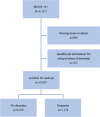A longitudinal cohort study on the use of health and care services by older adults living at home with/without dementia before and during the COVID-19 pandemic: the HUNT study
- PMID: 38641570
- PMCID: PMC11027287
- DOI: 10.1186/s12913-024-10846-y
A longitudinal cohort study on the use of health and care services by older adults living at home with/without dementia before and during the COVID-19 pandemic: the HUNT study
Abstract
Background: Older adults and people with dementia were anticipated to be particularly unable to use health and care services during the lockdown period following the COVID-19 pandemic. To better prepare for future pandemics, we aimed to investigate whether the use of health and care services changed during the pandemic and whether those at older ages and/or dementia experienced a higher degree of change than that observed by their counterparts.
Methods: Data from the Norwegian Trøndelag Health Study (HUNT4 70 + , 2017-2019) were linked to two national health registries that have individual-level data on the use of primary and specialist health and care services. A multilevel mixed-effects linear regression model was used to calculate changes in the use of services from 18 months before the lockdown, (12 March 2020) to 18 months after the lockdown.
Results: The study sample included 10,607 participants, 54% were women and 11% had dementia. The mean age was 76 years (SD: 5.7, range: 68-102 years). A decrease in primary health and care service use, except for contact with general practitioners (GPs), was observed during the lockdown period for people with dementia (p < 0.001) and those aged ≥ 80 years without dementia (p = 0.006), compared to the 6-month period before the lockdown. The use of specialist health services decreased during the lockdown period for all groups (p ≤ 0.011), except for those aged < 80 years with dementia. Service use reached levels comparable to pre-pandemic data within one year after the lockdown.
Conclusion: Older adults experienced an immediate reduction in the use of health and care services, other than GP contacts, during the first wave of the COVID-19 pandemic. Within primary care services, people with dementia demonstrated a more pronounced reduction than that observed in people without dementia; otherwise, the variations related to age and dementia status were small. Both groups returned to services levels similar to those during the pre-pandemic period within one year after the lockdown. The increase in GP contacts may indicate a need to reallocate resources to primary health services during future pandemics.
Trial registration: The study is registered at ClinicalTrials.gov, with the identification number NCT04792086.
Keywords: COVID-19; Dementia; Health care services; Longitudinal cohort study; Older adults.
© 2024. The Author(s).
Conflict of interest statement
The authors declare no competing interests.
Figures





References
-
- Brandl C, Zimmermann ME, Günther F, Dietl A, Küchenhoff H, Loss J, Stark KJ, Heid IM. Changes in healthcare seeking and lifestyle in old aged individuals during COVID-19 lockdown in Germany: the population-based AugUR study. BMC Geriatr. 2022;22(1):34. doi: 10.1186/s12877-021-02677-x. - DOI - PMC - PubMed
-
- Tu K, Sarkadi Kristiansson R, Gronsbell J, de Lusignan S, Flottorp S, Goh LH, Hallinan CM, Hoang U, Kang SY, Kim YS, et al. Changes in primary care visits arising from the COVID-19 pandemic: an international comparative study by the International Consortium of Primary Care Big Data Researchers (INTRePID) BMJ Open. 2022;12(5):e059130. doi: 10.1136/bmjopen-2021-059130. - DOI - PMC - PubMed
-
- Governmentof Norway: Timeline: News from Norwegian Ministries about the Coronavirus disease Covid-19 [https://www.regjeringen.no/no/tema/Koronasituasjonen/tidslinje-koronavir...]. Accessed 12 May 2023.
-
- Norwegian Institute of Public Health: Dødelighet i Norge under koronapandemien 2020 til høsten 2022 [Mortality in Norway during the corona pandemic 2020 to autumn 2022] [https://www.fhi.no/publ/2022/Dodelighet-under-pandemien/]. Accessed 22 June 2023.
MeSH terms
Associated data
LinkOut - more resources
Full Text Sources
Medical

